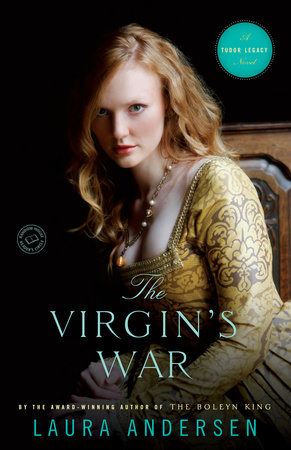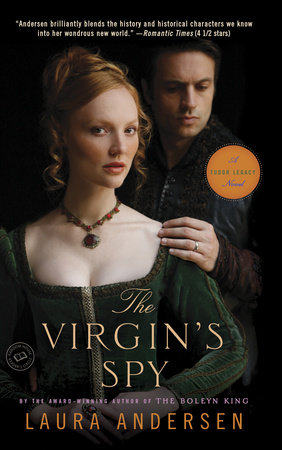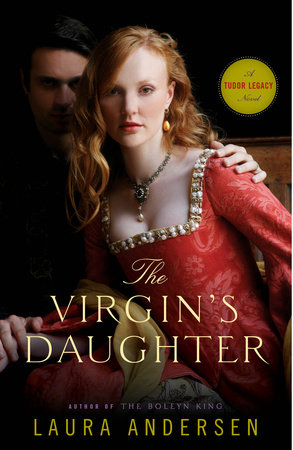Excerpt
The Virgin's War
One
November 1584
1 November 1584
Middleham Castle
Dear Kit,
I confess to being unreasonably envious of you! Would you believe that it snowed here yesterday? Yes, it melted by morning, but when I think of you and Stephen in the temperate Loire Valley, I long to board the first ship that will take me away from Yorkshire.
And yes, I know, I am the one who counseled Anabel to take up residence this far north. But do you not remember Madalena’s Moorish grandmother telling me that I am by nature contradictory? Who am I to gainsay such a wise woman?
I am not the only contradictory female in Yorkshire. I suppose you know from Anabel that Brandon Dudley and Nora Percy married suddenly last month. Not, despite what the gossips say, because there is a child coming too soon—no, for all its apparent suddenness, this wedding has been looming for some years. I am only surprised that they waited this long. Nora is already thirty and has been in love with Brandon forever. But her mother did not approve—probably because Eleanor Percy hoped that one day her daughter would learn to be as cynical at manipulating men as she is herself.
Although Eleanor’s manipulations have not been notably successful lately. The Earl of Ormond proved willing to be her lover, but not her husband. And with the dangerous situation in Ireland, Ormond has finally broken with Eleanor for good and sent her back to England. She was not invited to her daughter’s wedding.
Nor was the queen informed of the marriage in advance, despite Nora being her niece. Anabel is a little tense, awaiting her mother’s response.
I wish you would write more often. To me, not just to Anabel. It has been surprisingly lonely being apart from all my siblings. At least you and Stephen are together, and Lucie has Julien.
Still, there is little time to indulge in self-pity in this household. Anabel is almost as ferocious a ruler as her mother, and Matthew—
Pippa Courtenay broke off writing. For a woman who had often been told she never lacked for things to say, she could not find the words to finish that sentence. How to explain her current tenuous relationship with Matthew Harrington, a man she had known since birth? At the age of fifteen, she had allowed herself one reckless moment with him—and had spent the last seven years ensuring they never again crossed the boundaries of simple friendship.
Twice in the last eighteen months she had attempted to explain to him the wisdom of that decision and persuade him to look for his future happiness elsewhere. It had not gone according to plan.
Which seemed to be the theme of the Courtenay family these last two years. After a bloody mess in Ireland, her older brother Stephen had spent five months confined to the Tower of London. He’d subsequently lost his title and estates as Earl of Somerset, then been unofficially banished from England. Now he and Kit—Pippa’s twin—were training in France and serving with their father’s old friend, Renaud LeClerc. And Lucie, though gloriously happy in her marriage to Renaud’s son, Julien, had suffered three miscarriages in the last two years.
Hands came to rest on Pippa’s shoulders and she gasped. The Princess of Wales said teasingly, “Run out of things for which to scold Kit? I can provide you a list if you need it.”
“But then what will you write to him?”
Anabel took a seat next to Pippa, radiant in one of the soft-hued, luminous gowns meant to distinguish the princess from her royal mother’s taste for richer jewel-toned colours. With a small, secret smile, she confided to Pippa, “Don’t worry about me. I have no shortage of things to write to Kit.”
No doubt. Pippa put aside her unfinished letter and deliberately changed the subject from emotional entanglements to something less fraught. Like politics. “How is the news from Dublin?”
Anabel pulled a face. “It continues disastrous. With the fall of Waterford, only Dublin and Cork are open to reinforcements, and that’s presupposing we have any to send. No one thought the Spanish troops would remain in Ireland this long, but success breeds willingness and King Philip has had little difficulty rotating men in and out without losing the advantage.”
King Philip being also Anabel’s father. She had not referred to him as such, not even to Pippa, for two years. Not since the Spanish fleet had landed ten thousand soldiers to oppose English possession of Ireland. The Spanish king was the enemy now, or at least well on his way to becoming such.
“I suppose Mary Stuart continues to crow about it in her correspondence all over Europe,” Pippa noted. After escaping English captivity several years before, the one-time Scots and French queen had added Spain to her list of royal titles with her marriage to King Philip. Even more than her husband, Mary violently opposed all English interests.
“Certainly, Mary cannot contain her satisfaction when writing to her oldest son. James’s letters to me are three-quarters rants about his mother and one-quarter demands that England do something about Mary Stuart and Ireland. Not that he’s offering any material help.”
The courtship of King James VI of Scotland and England’s Princess of Wales had thus far been conducted entirely on paper. Pippa couldn’t help teasing, “Leaving no space for a single word in any of those letters about his most cherished bride-to-be?”
With simply the slant of her eyebrows and the curl of her lip, Anabel could switch from charming to haughty. Rather like her mother. “I am quite happy to escape fulsome and insincere compliments, I assure you. I am less happy when King James presumes to criticize England’s queen and Parliament for not sending more aid to Ireland. In my last letter, I pointed out that Scotland is also a Protestant nation and perhaps they would be interested in lending money or men for the fight in Ireland. I imagine that will shut him up for a bit.”
“This is quite the most amusing courtship I’ve ever witnessed,” Pippa offered lightly.
“Just so long as James remains content with the courtship rather than pressing for a consummation of the treaty.”
Anabel didn’t have to add the obvious—that she continued to hope the marriage might never take place. Anabel was stubborn and passionate and hardheaded and romantic all in one. As long as she remained unwed, there existed the smallest hope that she might be allowed to marry the man she loved: Kit Courtenay.
Pippa sighed inwardly. The course of true love never did run smooth. But this is beginning to be ridiculous. For all of us.
“The Queen of England will not be kept waiting by a rebel Irish countess!” Elizabeth Tudor snapped. It really wasn’t fair to snap at Burghley, who did no more than deliver the message that Eleanor FitzGerald was running late. But he’d had thirty years of serving royals and knew fairness was not to be expected.
That didn’t mean her Treasury Secretary wouldn’t offer his own retorts. “I could hardly burst into her bedchamber and drag her out half clothed,” he said mildly.
“Oh, she’s fully clothed, mark my words. This is a tactical move.” Elizabeth, a princess since birth and a queen since she was twenty-five, knew all about tactical moves. She allowed her ruffled temper to smooth into glass. “Eleanor FitzGerald thinks she is announcing Ireland’s independence. Truly independent rulers do not have to make such petty shows.”
She caught the mordant humour in Francis Walsingham’s eye at her pronouncement, but the Lord Secretary held his tongue. Like Burghley, Walsingham was present in order to intimidate the Irish countess as well as to provide Elizabeth with his experienced judgment after the encounter.
It was a further five minutes before the pages proclaimed the arrival of her ladyship, the Countess of Desmond. Arrived in England as emissary for the rebel earl, her husband, the only reason Elizabeth had agreed to meet with Eleanor FitzGerald was to impress upon the woman the might and power of the English court. Elizabeth had never been to Ireland, but she had read scores of accounts and knew that the Irish nobility—saving, perhaps, those such as her cousin, the Earl of Ormond—often lived in worse conditions than even her own middle-class merchants. Just because England was finding it difficult to fund a sufficient force of soldiers to beat back the Spanish didn’t mean the Irish had any chance at all in the end. Indeed, without Spain’s interference, the uprising would have long since been over.
A point Elizabeth did not hesitate to make when the tardy countess finally arrived and made her barely adequate curtsey. “I thought the entire point of Desmond’s rebellion was resistance to foreign interference,” the queen intoned. “We English have been part of Ireland for more than four hundred years, and yet we are accounted more foreign than the Spanish, who share no heritage with you at all?”
Twelve years younger than the queen, the thirty-nine-year-old Eleanor was not easily frightened. Dressed soberly in a black gown that perhaps hinted at cultural mourning, the dark-eyed countess said stoutly, “The Spanish share our faith. And we have less quarrel with foreign soldiers who fight and then leave, than we do with men who seize our lands for their own and pretend they belong.”
“As did the FitzGeralds,” Elizabeth pointed out waspishly. “Not all that many generations ago.”
“Long enough ago that we have earned the right to govern our own lands, and ensure our children can do the same,” Eleanor blazed back. With two sons and four daughters, the countess had all the protective instincts of a mother. Perhaps even more than her husband’s future, she wanted to ensure her children’s.
At this point Lord Burghley intervened with his trademark logic. “If you believe the Spanish will allow you self-governance, then you are being willfully blind. It is just possible that King Philip is willing to commit troops merely for principle’s sake, but Mary Stuart wants much more. Surely you have heard the rumors that their youngest son will be proclaimed Prince of Ireland in the coming year.”
“He is two years old. We do not fear a child. Not the way we fear men who have determined the best way to rule Ireland is to murder every last Irish soul, thus leaving a clean slate for the English.”
Elizabeth waved a hand in disdain. “I am not impressed by overwrought melodrama. If you want the fighting in Ireland to stop, the answer is simple: evict the Spanish. When you have done that, then England and Ireland will have something to say to one another. Until then, go back to your husband. Tell him I have no place for traitors at my court. You will be escorted back to your ship tomorrow. My lady countess,” she added pointedly.
The queen almost thought the woman would respond, for Eleanor had a very Irish glint in her eyes, but protocol prevailed. When Lady Desmond had left, Elizabeth looked at the one man in her government sure to have even more disdain for the countess than she herself. Burghley was a realist, but Francis Walsingham despised Catholics and the Spanish in equal measure. Long an advocate of a swift, harsh end to Ireland’s rebellions, he was even more fiery now that the Irish were supported by Philip’s troops.
“Well?” she asked her Lord Secretary pointedly.
Walsingham’s hooded eyes had never grown easier to interpret. “The Spanish won’t go. Not until they’ve made a serious play for Dublin.”
“Dublin will never fall.”
“Not in battle, but it might be starved into submission. If the Spanish decide to blockade the port—”
“Then they will be committing to open warfare against all our forces,” Elizabeth snapped. “Philip isn’t prepared for that.”
“Yet.” Walsingham let the syllable hang ominously, but said no more.
Elizabeth would like to have believed her Lord Secretary had learned discretion during his banishment from her court two years ago, but she doubted it. Walsingham was who he was and she valued him for it. Even if sometimes she wanted to kill him as well.
Of the two of them, Walsingham did not hold grudges. And though Elizabeth did, she knew the difference between wisdom and vanity. He had hurt her pride two years ago with his opposition to her proposed French marriage, but she could swallow pride for the greater good. Especially as there was no chance of that particular dispute resuming, for Francis, the young Duc d’Anjou, had died earlier this year of a tertian fever. It was just as well the queen had thought to take Anjou for herself and tied Anabel to James of Scotland, or else England would be doing some rapid maneuvering at this point.






